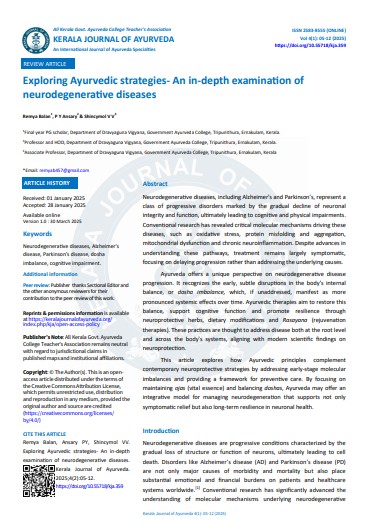Exploring Ayurvedic strategies- An in-depth examination of neurodegenerative diseases.
DOI:
https://doi.org/10.55718/kja.359Keywords:
Neurodegenerative diseases, Alzheimer's Disease, Parkinson's disease, Dosha imbalance, cognitive impairmentAbstract
Abstract
Neurodegenerative diseases, including Alzheimer's and Parkinson's, represent a class of progressive disorders marked by the gradual decline of neuronal integrity and function, ultimately leading to cognitive and physical impairments. Conventional research has revealed critical molecular mechanisms driving these diseases, such as oxidative stress, protein misfolding and aggregation, mitochondrial dysfunction, and chronic neuroinflammation. Despite advances in understanding these pathways, treatment remains largely symptomatic, focusing on delaying progression rather than addressing the underlying causes.
Ayurveda offers a unique perspective on neurodegenerative disease progression. It recognizes the early, subtle disruptions in the body’s internal balance, or dosha imbalance, which, if unaddressed, manifest as more pronounced systemic effects over time. Ayurvedic therapies aim to restore this balance, support cognitive function, and promote resilience through neuroprotective herbs, dietary modifications, and Rasayana (rejuvenation therapies). These practices are thought to address disease both at the root level and across the body's systems, aligning with modern scientific findings on neuroprotection.
This article explores how Ayurvedic principles complement contemporary neuroprotective strategies by addressing early-stage molecular imbalances and providing a framework for preventive care. By focusing on maintaining ojas (vital essence) and balancing doshas, Ayurveda may offer an integrative model for managing neurodegeneration that supports not only symptomatic relief but also long-term resilience in neuronal health.





